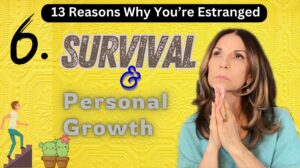A family member estranging themselves from one or more family members can be heartbreaking and difficult to handle. How is your situation of estrangement affecting the rest of your family? The many perspectives and circumstances of estrangement within a family can lead to various responses. When family members try to make sense of family conflicts and rifts, there is a likelihood of poor communication and intense emotions.
This article discusses How to Deal With Estranged Family Members When Siblings and Parents Are Estranged.
When a family member cuts off, it is common for them to also cut off from one or more members, including siblings. Research on sibling estrangement is low; however, we know that about 27% of the US population becomes estranged from one or more family members.
Why Does An Adult Child Cut Off From A Sibling?
Often when siblings are at odds, it has to do with how they view their connection concerning their parents. Parental favoritism can lead to a sibling cutting off another sibling. It refers to when a child notices or feels the parent loves or favors the other sibling more. They tend to call out unfair consequences or differences in their upbringing. Sibling rivalry is also a common factor in why siblings will separate. The pair of siblings are highly competitive with one another, often being an attempt to gain favor with a parent. Sibling rivalry may lead to resentment and jealousy. Perhaps for having something the other sibling wanted or a conflict between the siblings that was left to sour. Siblings who experience gaslighting, physical/mental bullying, and verbal criticism, will sometimes suffer enough to remove themselves from the relationship with their sibling. These are enough reasons for a sibling to distance themselves from their sibling and abandon the relationship.
Why Do Adult Children Cut Off Their Parents?
Depending on your situation, it may or may not correlate with any of the listed reasons above. Toxic abuse by parents, disrespect, favoritism and uninvolved or overbearing parenting are all reasons your adult child may have chosen estrangement. Having differing values or an extremely close family can also lead to separation when the adult child is ready for complete independence.
On The Outside Looking In
Suppose one or more of your siblings has estranged themselves from the family, or your adult child has estranged themselves from a sibling. In this case, you may be experiencing disruptions in your everyday communication. Sometimes the rift begins with either the parent or the sibling, and the other party will insert themselves into the split by trying to fix it, make demands, find resolutions or take sides. Often the outside family member means well but may create more problems by trying to resolve, discuss, and find out more information.
So, what should family members who are not directly involved with the initial cut-off do? It’s hard to sit back and witness your family unit become something you don’t recognize. It feels terrible when someone you love gets rejected; naturally, you may want to help resolve this problem. Before becoming a middle-man, there are a few things you should consider.
1. Is It Worth It?
Consider if inserting yourself into the family conflict is worth the risk of further alienating the estranged family member.
2. Minding Your Own Business
If you and your estranged family member are on speaking terms still, then their issue is not with you. When you involve yourself, it may worsen the conflict because you do not know the entire story.
3. Keep A Boundary About Not Taking Sides
You may want to take a side, but if you are hoping for resolution and reconciliation, taking a side will further complicate the rift.
4. Offer The Estranged Family Member Your Support.
You can listen to what they say, validate their feelings, and respect them enough to know they have good reasons to disconnect. You may disagree with what they are saying, but if you still want a relationship with them and don’t want to help stir up more problems for the family, you will remain neutral. Your family member is estranged because the relationship became unmanageable. Supporting your estranged family doesn’t mean you take sides or betray your other family members. What if you want to take sides and give your family member a piece of your mind and set them straight? If your goal is to keep your family intact and be a healthy relational unit, your strategy will likely backfire.
5. Get Support For Yourself
These circumstances are complicated, and there is no quick fix. The average length of estrangement is 4.5 years. It can be very challenging, and the uncertainty of what will happen can be anxiety provoking. You can do many things to help yourself get through this difficult time. Getting support will help you navigate the separation in better ways.
6. Have Patience
Family rifts can be uncomfortable; however, research shows that people soften and decide to resume relationships in time unless there has been toxicity and abuse. In this case, unless the offending person has changed, it is recommended that the estranged person does not resume a relationship.
Estrangement creates an emotional and physical distance that is psychologically troublesome for all involved—the length of separation and when it will end also vary. Continue to take care of yourself, seek support, give support, and know you don’t have to go at it alone. This article discusses How To Deal With Estranged Family Members (When Siblings And Parents Are Estranged).






